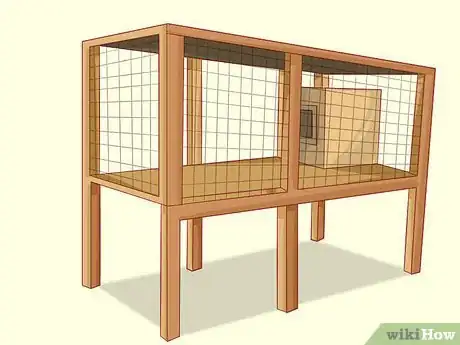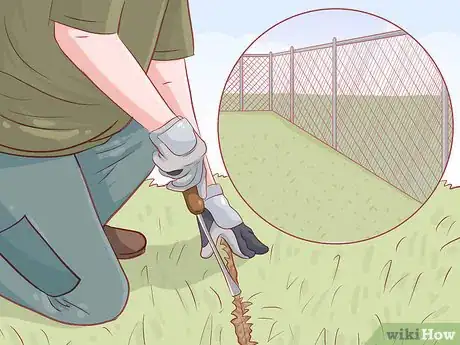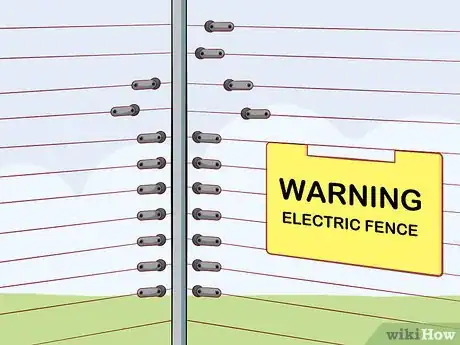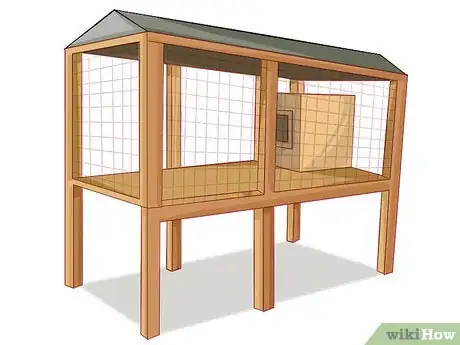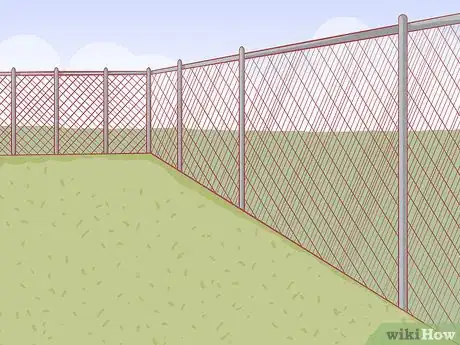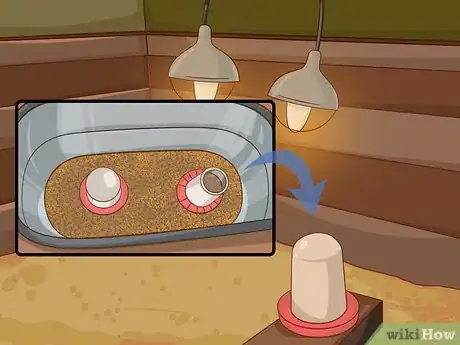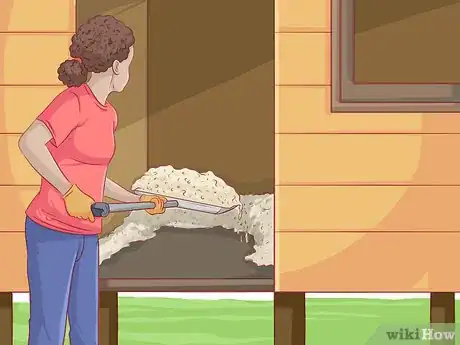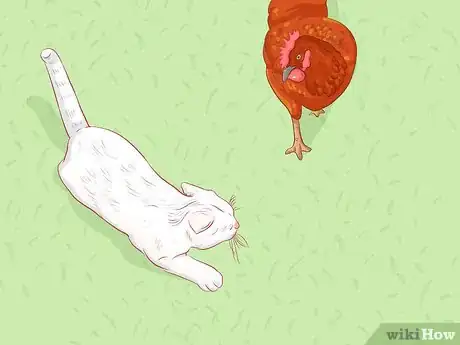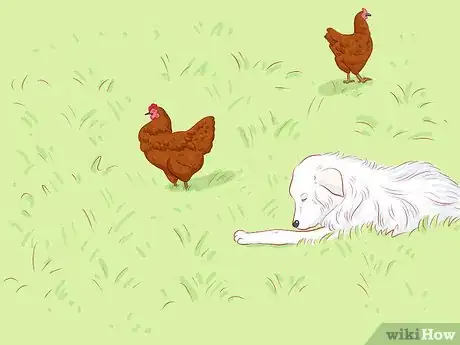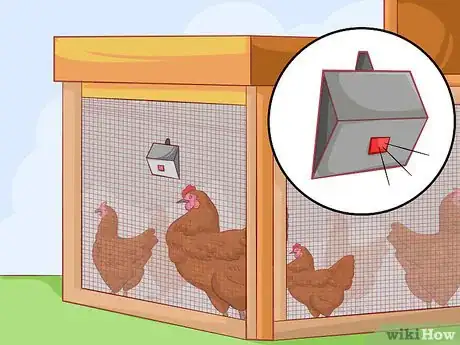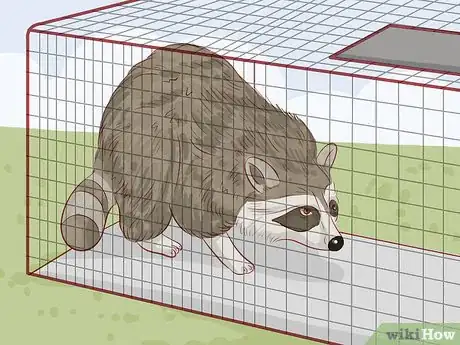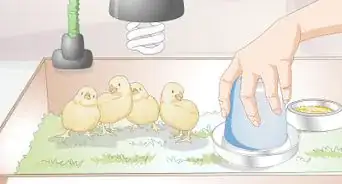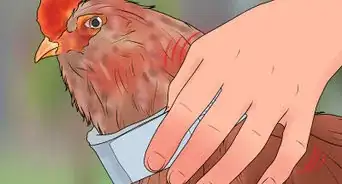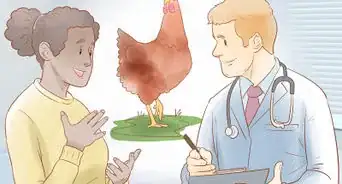This article was co-authored by wikiHow Staff. Our trained team of editors and researchers validate articles for accuracy and comprehensiveness. wikiHow's Content Management Team carefully monitors the work from our editorial staff to ensure that each article is backed by trusted research and meets our high quality standards.
This article has been viewed 76,933 times.
Learn more...
Chickens can be very vulnerable to predators such as foxes, coyotes, and other carnivores. Protecting chickens requires a little forethought and some regular maintenance. Build the right structures to keep predators out. Manage your chickens' eating and sleeping routine to keep them safe. You can also invest in traps and guard dogs to repel predators.
Steps
Improving Chicken Housing
-
1Build your coop off the ground. When building a coop, elevation can help protect your chicken from potential predators. This can prevent rodents from nesting near your chicken coop, as they will be more exposed. Ideally, have your coop elevated about a foot off the ground.[1]
- Unless you're very familiar with building yourself, it's best to have professionals build your chicken coop.
-
2Bury fences underground to keep vermin out. If your coop is already in place, it may be hard to elevate it. However, you can actually insert fences under the ground. This can help protect your chickens from animals that burrow, such as rats.[2]
- You should bury about six inches of fencing wire under the ground to protect your chickens.
Advertisement -
3Try an electric fence. Make sure the electric current is not too strong. You do not want your chickens to be harmed by an electric fence. Look for electric wiring that aims to stun predators rather than kill them.[3]
- If you're not familiar with building fences or working with electronics, have the fence installed professionally. You do not want to end up electrocuting yourself while building the fence.
-
4Use a roof to protect your chickens from flying predators. Chickens are also vulnerable to attacks from flying animals such as hawks. A wire mesh roof should be installed over the coop and run. This can prevent hawks from sweeping in and picking up chickens.[4]
-
5Opt for a tall mesh fence. Your chicken's coop and run should be surrounded by a fence. A fence should not just serve to keep your chickens inside. It should also protect them from predators. A mesh fence is the ideal material to keep things like foxes and raccoons out of your chicken coop.[5]
- Your fence should be at least five feet high to protect your chickens.
Changing Your Routine
-
1Keep your chickens in a secured location at night. Do not let your chickens roam the backyard at night. Many nocturnal predators, like raccoons, may prey on the chickens at night. Before bed, always secure your chickens in their coop to keep them safe.[6]
-
2Take precautions with food. Be very careful about storing food. The scent of chicken feed can attract predators to your coop. Chicken feed should be stored in secure, closed containers. You should also be careful with food if you have other animals. Do not leave dog or cat food outside overnight, especially not near the chicken coop.[7]
-
3Be vigilant about cleaning the coop. Make a daily habit of cleaning the coop. You want to clear out any material that may attract predators. At the end of the day, scoop up and discard any fallen chicken feed from the coop. If you give your chickens table scraps, remove the table scraps as well.[8]
- If you have fruit trees near your chicken coop, be on the lookout for fallen fruit.
Repelling Feral Animals
-
1Use cats for protection only if they are familiar with chickens. Cats can help target many predators such as rats and vermin. However, cats may also view chickens as prey. Only use cats as protection if they're comfortable around chickens.[9]
- New cats and kittens can be introduced to chickens gradually, especially at a young age. Have them interact through a fence or enclosure for a few weeks. Then, try a face-to-face interaction in which the chicken and cat are both restrained.
- All cats are different. Some cats will always target chickens as prey, even when properly introduced. If your cat seems aggressive towards chickens, even after controlled interactions, you should not let the cat outdoors near the chickens.
-
2Invest in dogs. Farm dogs can be great for protecting chickens. Working breeds like Border Collies will chase off potential predators. However, dogs may sometimes target chickens as well. It's a good idea to keep dogs outside of a chicken coop. If you notice a dog being aggressive towards a chicken, scold the dog in the moment. Eventually, your dog may learn to leave chickens alone.[10]
-
3Use light to scare off predators. Install a bright security light or a motion-activated light near a coop. Bright lights can help deter predators at night when you and your chickens are sleeping. Lights may scare potential predators away from the coop.[11]
-
4Be wary about setting traps. If your chickens are being targeted frequently by a predator, you can set baited traps. However, traps should only be used in extreme circumstances, as their effectiveness is questionable. Predators like raccoons often travel in groups, so you will have to take out an entire family for traps to be effective. If you do set traps, you will need consistently keep them up for a while to catch all predators.[12]
- You should also make sure to release animals like skunks and raccoons far away from other people's homes. You do not want to simply make predators another person's problem.
Community Q&A
-
QuestionCan squirrels pass disease onto chickens?
 Amy HarrisonTop AnswererGenerally, any creature can pass on disease to poultry, especially wild rodents. Squirrels are said capable of carrying diseases that pass on through their urine, such as Weil's Disease. You can prevent squirrels from populating the area by keeping food secured away in plastic storage containers, or setting up humane traps, if legal in your state.
Amy HarrisonTop AnswererGenerally, any creature can pass on disease to poultry, especially wild rodents. Squirrels are said capable of carrying diseases that pass on through their urine, such as Weil's Disease. You can prevent squirrels from populating the area by keeping food secured away in plastic storage containers, or setting up humane traps, if legal in your state. -
QuestionHow do I add protection to a pre-made coop?
 Zeta WhitmerCommunity AnswerReinforce any openings with chicken wire, since small mammals, like weasels, can easily get through tiny spaces, but it is hard for them to get through the little holes in chicken wire.
Zeta WhitmerCommunity AnswerReinforce any openings with chicken wire, since small mammals, like weasels, can easily get through tiny spaces, but it is hard for them to get through the little holes in chicken wire. -
QuestionHow do I keep chicks safe from black rat snakes?
 Amy HarrisonTop AnswererStart off by inspecting the coop for damaged or weakening wood that could be used as access points by snakes. Small opening or holes along the coop can make an easy entrance for small predators alike. It's important to repair damages and to reinforce the coop with chicken wire. If you find that the chicken wire holes/opening are too wide, and the wire infirm, upgrade to 1/4" hardware cloth. Purchase a humane and specifically-built trap from a hardware or ranch store to trap any imposing snakes that enter the coop.
Amy HarrisonTop AnswererStart off by inspecting the coop for damaged or weakening wood that could be used as access points by snakes. Small opening or holes along the coop can make an easy entrance for small predators alike. It's important to repair damages and to reinforce the coop with chicken wire. If you find that the chicken wire holes/opening are too wide, and the wire infirm, upgrade to 1/4" hardware cloth. Purchase a humane and specifically-built trap from a hardware or ranch store to trap any imposing snakes that enter the coop.
References
- ↑ http://www.grit.com/animals/predators-of-chickens?pageid=2#PageContent2
- ↑ http://www.ci.brainerd.mn.us/DocumentCenter/Home/View/469
- ↑ http://articles.extension.org/pages/71204/predator-management-for-small-and-backyard-poultry-flocks
- ↑ http://www.grit.com/animals/predators-of-chickens?pageid=2#PageContent2
- ↑ http://www.grit.com/animals/predators-of-chickens?pageid=2#PageContent2
- ↑ http://articles.extension.org/pages/71204/predator-management-for-small-and-backyard-poultry-flocks
- ↑ http://www.grit.com/animals/predators-of-chickens?pageid=2#PageContent2
- ↑ http://www.grit.com/animals/predators-of-chickens?pageid=2#PageContent2
- ↑ https://www.backyardchickencoops.com.au/can-you-keep-cats-and-chickens-together-in-the-same-backyard
About This Article
To protect your chickens from feral animals, keep them in a secure coop at night so nocturnal predators, like raccoons, can't get to them. Clean out the coop every day since uneaten chicken feed can attract predators. You might also want to set up a motion-activated light on the coop to scare off any predators that go near it at night. If you're worried that your chicken coop isn't secure enough, consider building or buying a new one that's elevated off the ground and covered with a roof, which will help keep out most predators. To learn how to use a cat or dog to guard your chickens, scroll down!
